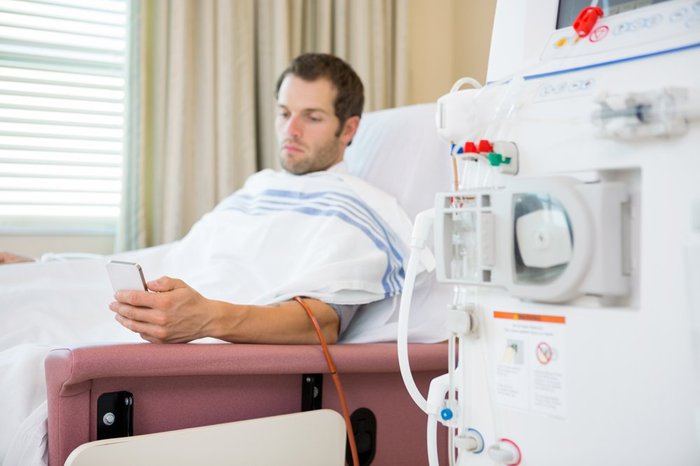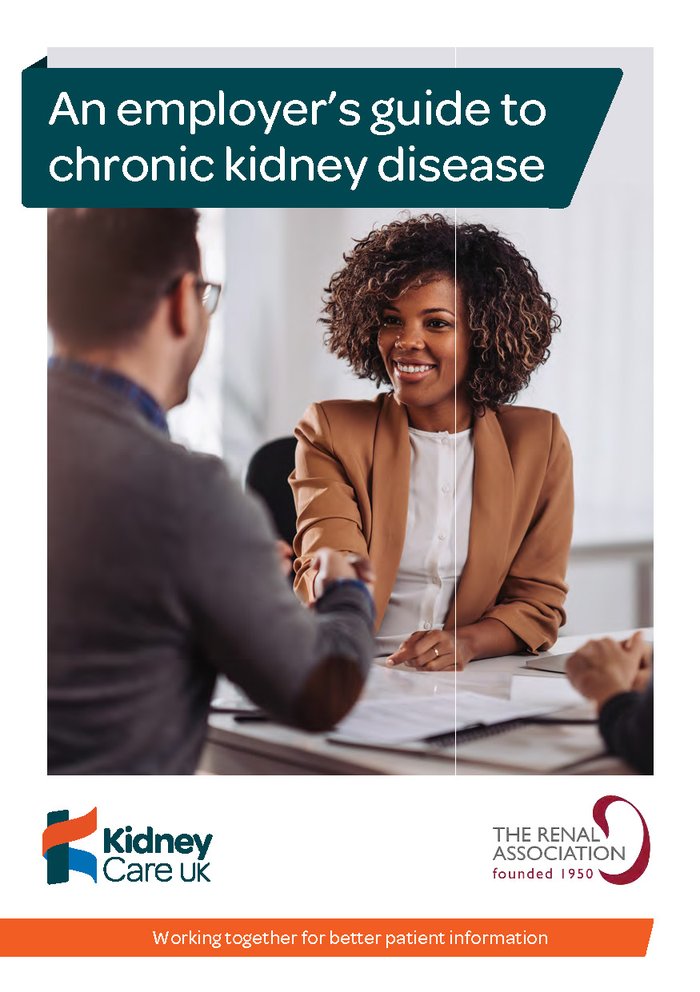Please note: the following information is for employers of kidney patients. If you are a kidney patient, see our page on employment rights for people living with CKD.
This page gives more information about CKD and its treatment, how this may affect your employee and what you can do to help.
Chronic kidney disease (CKD) is a long-term condition where the kidneys do not work as well as they should. They may have been damaged or affected by disease.
CKD can affect people in different ways. It is therefore important to talk to your employee in confidence about their specific situation and requirements.
What do your kidneys do?
- Most people have two kidneys. They are about the size of your clenched fist, they each weigh around 150g and are shaped like kidney beans.
- They sit in your lower back under the bottom ribs.
- They filter your blood every minute of the day. Your blood goes through your kidneys 40 times a day. There are 140 miles of tubes and a million filters in your kidneys.
- They are the hardest working organs in your body. They use 25% of the blood from every heartbeat.
- Kidneys make urine. They control the amount of salt and water in your body, making around 2 litres of urine each day. They remove waste products from your blood by passing them out in your urine.
- Kidneys produce hormones and red blood cells. They regulate your blood pressure. They help to keep your bones healthy by balancing the levels of important minerals in your body. They help to make the red blood cells that carry oxygen around the body.

What is CKD?
Chronic kidney disease (CKD) means that the kidneys do not work as well as they should. They stop being able to remove waste products from the body so these start to build up. This can cause damage to other organs which can have an impact on a person’s overall health and wellbeing. The term ‘chronic’ means that it is a long-term condition which is unlikely to improve, although it may remain stable.
Many cases of CKD are mild and can be managed with help from GPs and without hospital involvement. When CKD becomes more advanced or severe it is usually managed under the care of the hospital renal (kidney) team.
For more information about CKD, visit our chronic kidney disease page.
How is CKD diagnosed?
- Most people are diagnosed by a blood and urine test. Specialist hospital investigations may also be needed such as a biopsy. This will depend on what has caused the kidney disease.
- CKD is categorised in stages from one to five, based on how well the kidneys are working. Stage five is the most advanced and is also known as end stage kidney disease.
- For many people, kidney function remains stable. However, for some people with CKD it can slowly get worse over time and a very small number of people will need specialist treatment.
| Stage of Chronic Kidney Disease | Description |
|---|---|
One |
Kidney function remains normal but urine findings suggest kidney disease. |
Two |
Slightly reduced kidney function with urine findings suggesting kidney disease. |
Three |
Moderately reduced kidney function |
Four |
Severely reduced kidney function |
Five |
Very severe or end-stage kidney failure |
Is chronic kidney disease common?
Yes. Around 10% of people in the UK have CKD.
Usually it is mild and it may not become severe. The vast majority of patients with CKD do not have any symptoms and do not need specialist input.
Who gets CKD?
CKD can affect children and adults of any age. Some people are born with it and some develop it as they get older. It can run in families and is more common in people from Asian or African backgrounds. CKD is not contagious and is not caused by alcohol abuse.

What are the symptoms of CKD?
Most people do not have symptoms related to CKD. Even when the kidneys are damaged, they can still work well enough to prevent any symptoms.
Symptoms may only be noticeable with more advanced kidney disease. These can vary from each person who has kidney disease and may include:
- Tiredness, low energy levels
- Generally feeling ill, lack of interest in everyday activities and loss of concentration
- Muscle weakness
- Swollen ankles and breathlessness due to a build up of fluid
- Difficulty sleeping at night (insomnia)
- Passing urine more often at night
- Feeling sick
- Lack of appetite
- Headaches
- Itching
- Aching bones
- Muscle cramps
What treatment is available?
Most people with mild CKD (stages one to three) can manage the condition themselves with support and medicine from their GP. However for a small number of people their CKD will get worse and they may develop more severe kidney disease which will need specialist input from kidney doctors.
It is very important that everyone with CKD attends their appointments – at their GPs or hospital – in order to keep their kidney function as stable as possible.
There are two main types of treatment for severe kidney disease (stages four and five) – dialysis and transplant. These are known as renal replacement therapy. All treatments are provided free of charge by the NHS.
Dialysis is a process of removing the toxins from the blood. There are two main types of dialysis:
- Haemodialysis (HD) works by taking blood from the body via a tube in a large blood vessel in the chest or a fistula in the arm and ‘cleaning it’ in a machine to remove the toxins. HD is usually needed for at least four hours, three times a week. It can take place in hospital or at home. If your employee is receiving dialysis in hospital, they will be given a specific time slot to attend hospital and it is very important that they go to every appointment.
- Peritoneal dialysis (PD) uses the lining of the abdomen (peritoneum) to filter the blood inside the body. A tube is inserted into the abdominal cavity that stays in place all the time the person needs peritoneal dialysis. This filtering will remove waste products that have built up in the blood stream. Your employee can perform PD themselves. Each treatment takes about 30 to 40 minutes and four to six treatments are usually needed each day. Alternatively, they may choose to have automated peritoneal dialysis (APD), which is done by a machine overnight while they sleep.
The other form of treatment for advanced kidney disease is a transplant which is when the person receives a new kidney from a donor. This may be from a deceased donor, a living friend or relative or an altruistic stranger.
There are about 5,000 people waiting for a deceased donor kidney transplant in the UK at the moment and the average waiting time for a kidney is around two years. Your employee may be called for a transplant at very short notice and will need time off work to recover afterwards. This will usually be around two-three months but may be shorter depending on their job and your employee’s health. A phased return to work is likely to be helpful and you should discuss this with your employee and your Human Resources (HR) department.

A kidney transplant can last, on average, between 10-15 years. It should improve your employee’s health and quality of life, and prevent the need for dialysis, but it is not a cure. Most transplant recipients will still have some form of kidney disease and will need to take medicines for the rest of their life and attend regular check-ups.
There is a small chance that the new kidney will not work or is later rejected. This might mean that your employee needs to go back on dialysis or requires another transplant in the future.
I have been working for our supermarket’s Head Office for 33 years. They have supported me through two of my three kidney transplants and 15 of my 22 years on dialysis. They gave me a private room with a key to do my dialysis at work and they let me do flexitime around my many appointments. They have been brilliant.Paul, Kidney Care UK supporter
How can a diagnosis of CKD affect an employee’s work?
If your employee has mild or moderate CKD (stages one-three) they may have very few symptoms and still feel well. They will usually be able to manage well at work and are unlikely to take a lot of time off sick.
However, more advanced CKD can make people feel very unwell, even when it is being actively treated. They may feel very tired, sick or in pain. These can all make it hard to keep working and may mean that your employee has to have a lot of time off sick. They may also have to take time off work for hospital appointments or dialysis sessions. As their CKD progresses, they may feel unable to work at all. It is important to talk to your employee to discuss their individual situation. Your HR department can help with this.
It is against the law to discriminate against an employee, make them redundant or force them to retire because of ill health.

What can I do to help?
Encourage your employee to talk to you and your HR department to discuss how reasonable adjustments can be made to make their working life easier. This will depend on their individual work situation but could include:
- Conducting a workplace assessment
- Changing their hours to suit their dialysis schedule
- Allowing them time off work to attend their hospital appointments
- Changing their job responsibilities – for example, to avoid heavy lifting if they are on dialysis or have had a transplant or looking at their work hours if they find concentrating harder
- Allowing them to work from home for some or all of the week
- Providing access to an occupational therapist
- Allowing your employee access to a private space such as a first aid room if they wish to carry out PD during work hours
- Providing adapted computer equipment or better seating
- Allowing them to take more breaks if they need them
- Keeping in touch with your employee if they are off sick, without pressuring them to return to work before they are ready
"I have worked as a bus driver since June 2014 and have always been upfront about my kidney issues. When I joined the company, I had a functioning kidney transplant but warned them the day may arrive where it would not work as effectively. To assist me with attending hospital appointments and the like, I was placed on a rota working permanent late shifts, anything from 13.00-midnight (this helped them too as not many people liked lates and they were always the hardest shifts to cover!).
Towards the end of 2016 I started to become ill and I warned the company that ‘the time’ was coming. My hospital appointments increased and again, they did everything they could to accommodate this. In February 2017 my transplant failed and I had to go onto dialysis which would mean attending hospital three times a week for four hours at a time.
I sat down with the General Manager who basically asked “What do you need from me to make this work?” This was a huge weight off my mind as I was concerned how I would fit dialysis around a job I loved but which had very antisocial hours. I explained that rather than being on a rota, it would help to have a ‘fixed shift’ pattern, so in other words I did the same thing each week rather than rotating shift and rest day patterns.
It was established after a bit of trial and error that the best way for it to work was that I would do the ‘Twilight shift’ on dialysis (18.00-22.30) and then work an early shift on my dialysis days (finishing before 15.00) and a ‘middle’ shift the day after (starting generally around 11.00) as this would save me rushing around to get there and panicking about being late and give me time to recover if I had a bad session the previous night.
At all times they have said to me if any aspect of it is not working to let them know and they’ll work with me to find a workable solution. With regards to annual holidays, they are aware that as well as booking accommodation, I also need to book dialysis slots well in advance for where I am staying and again, they have always helped out with dates required.
In return, in the four years I have been on dialysis, I have achieved 100% attendance at work in three out of the four years. This would not have been possible without the support and encouragement of my employers. Going on dialysis was a very stressful time for me but being able to take away the worry of the impact it would have on my job has made the process so much more bearable."
Tony, March 2021
Where can I find out more information?
Kidney Care UK’s Patient Support & Advocacy Service can provide help and support with employment issues, including support in employee – employer meetings. Our Officers are also able to refer your case on to additional organisations for more specialist support if required.
An employer's guide to chronic kidney disease: download or order Kidney Care UK's information leaflet
You can download our Employer's guide to chronic kidney disease leaflet for free.
You can also order a printed copy of Kidney Care UK’s Employment Rights leaflet to be sent to you in the post.
